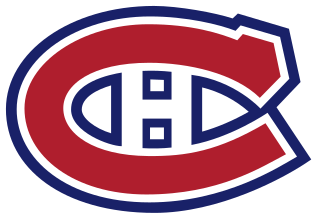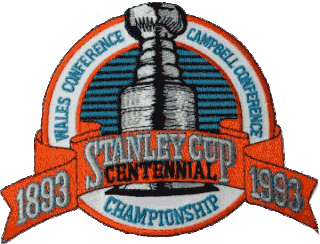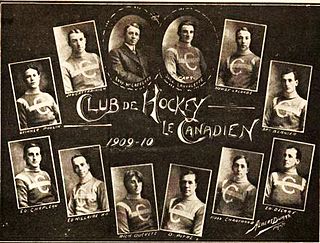Related Research Articles

The Montreal Canadiens, officially le Club de hockey Canadien and colloquially known as the Habs, are a professional ice hockey team based in Montreal. The Canadiens compete in the National Hockey League (NHL) as a member of the Atlantic Division of the Eastern Conference. Since 1996, the team has played its home games at Bell Centre, originally known as Molson Centre. The Canadiens previously played at the Montreal Forum, which housed the team for seven decades and all but their first two Stanley Cup championships.

Patrick Jacques Roy is a Canadian professional ice hockey coach, executive and former player who is the head coach for the New York Islanders of the National Hockey League (NHL). Roy previously served as head coach for the Colorado Avalanche of the NHL, as well as the Quebec Remparts of the Quebec Major Junior Hockey League (QMJHL). In 2017, he was named one of the 100 Greatest NHL Players in history and was hailed in sports media as "king of goaltenders".

Robert Michael Gainey is a Canadian former professional ice hockey player who played for the Montreal Canadiens from 1973 until 1989. After retiring from active play, he became a hockey coach and later an executive with the Minnesota North Stars/Dallas Stars organization before returning to Montreal as general manager from 2003 to 2010. Currently, Gainey serves as a team consultant for the St. Louis Blues as well as a volunteer senior advisor for the Peterborough Petes of the Ontario Hockey League. He was inducted into the Hockey Hall of Fame in 1992. In 2017 Gainey was named one of the '100 Greatest NHL Players' in history.

Serge Aubrey Savard is a Canadian former professional ice hockey defenceman, most famously with the Montreal Canadiens of the National Hockey League (NHL). He also served as the Canadiens' Senior Vice President of Hockey Operations and as their general manager. He is a businessman in Montreal, and is nicknamed "The Senator." In 2017 Savard was named one of the 100 Greatest NHL Players in history.
Joseph Daniel Mario Tremblay is a former professional ice hockey player and coach in the National Hockey League (NHL). As a player, he was a five-time Stanley Cup winner with the Montreal Canadiens.

The 1993 Stanley Cup Finals was the championship series of the National Hockey League's (NHL) 1992–93 season, and the culmination of the 1993 Stanley Cup playoffs. It was contested between the Los Angeles Kings and the Montreal Canadiens. It was the first appearance in the Final for the Kings and the first appearance since the 1920 Stanley Cup Finals for a team based on the west coast of the United States. It was also the 34th appearance for Montreal, their first since the 1989 Stanley Cup Finals. The Canadiens defeated the Kings in five games to win the team's 24th Stanley Cup. The year 1993 was the 100th anniversary of the first awarding of the Stanley Cup in 1893, and the first Finals to start in the month of June. To date, the 1993 Canadiens are the last Stanley Cup championship team to be composed solely of North American-born players, and the last Canadian team to win the Stanley Cup.
Réjean Houle is a Canadian former professional ice hockey forward who played the majority of his career with the Montreal Canadiens of the National Hockey League (NHL), also serving in a controversial stint as general manager for the Canadiens.
Pierre Boivin, OC is a French Canadian businessman and was president of the Montreal Canadiens from September 2, 1999, through June 30, 2011, succeeding Ronald Corey. In July 2024, he succeeded John McCall MacBain as chancellor of McGill University.
Irving Grundman was a Canadian ice hockey executive and municipal politician. He served as general manager of the Montreal Canadiens from 1978 to 1983. He also served on the Montreal City Council. Prior to his career in hockey and politics, he was the co-founder of the Laurentian Lanes bowling alleys.

The 1986 Stanley Cup Final was the championship series of the National Hockey League's (NHL) 1985–86 season, and the culmination of the 1986 Stanley Cup playoffs. It was contested between the Campbell Conference champion Calgary Flames and the Wales Conference champion Montreal Canadiens. The Canadiens won the best-of-seven series in five games to win their 23rd Stanley Cup, and their 17th in their last 18 Finals appearances dating back to 1956.
The 1977 Stanley Cup Finals was the championship series of the National Hockey League's (NHL) 1976–77 season, and the culmination of the 1977 Stanley Cup playoffs. It was contested between the Boston Bruins and the defending champion Montreal Canadiens. The Bruins were making their first appearance in the final series since their loss in the 1974 Final. The Canadiens would win the best-of-seven series four games to none, to win their second straight Stanley Cup championship, and 20th overall.
The 1978 Stanley Cup Finals was the championship series of the National Hockey League's (NHL) 1977–78 season, and the culmination of the 1978 Stanley Cup playoffs. It was contested between the Boston Bruins and the defending champion Montreal Canadiens, making their third straight appearance in the Finals. The series was a rematch of the 1977 Stanley Cup Finals. The Canadiens won the best-of-seven series, four games to two, to win their third consecutive Stanley Cup championship and their 21st overall. This was the last time that both the Boston Bruins and Montreal Canadiens met in the Stanley Cup Finals. The Canadiens eventually joined the Bruins in the Adams Division in 1982.
The 1979 Stanley Cup Finals was the championship series of the National Hockey League's (NHL) 1978–79 season, and the culmination of the 1979 Stanley Cup playoffs. The New York Rangers challenged the defending champion Montreal Canadiens, who made their fourth straight appearance. It was New York's first foray into the Finals since 1972. The Canadiens would win the best-of-seven series, four games to one, to win their fourth consecutive Stanley Cup championship.
The 1971 Stanley Cup Finals was the championship series of the National Hockey League's (NHL) 1970–71 season, and the culmination of the 1971 Stanley Cup playoffs. It was contested between the Chicago Black Hawks and the Montreal Canadiens. The Black Hawks made their first appearance in the finals since 1965, while the Canadiens had last played in and won the final in 1969. The Canadiens won the series, four games to three.
The 1969 Stanley Cup Finals was the championship series of the National Hockey League's (NHL) 1968–69 season, and the culmination of the 1969 Stanley Cup playoffs. It was contested between the defending champion Montreal Canadiens and the St. Louis Blues, a rematch of the previous year's finals. As they did in the previous matchup, the Canadiens won the series in four games.
The 1995–96 Montreal Canadiens season was the club's 87th season. This season was notable for the trade of star goaltender Patrick Roy, as well as being their final season in the Montreal Forum before moving to the new Molson Centre. The club qualified for the playoffs, but lost in the first round to the New York Rangers.

The Montreal Canadiens ice hockey club, formally Le Club de Hockey Canadien, was founded on December 4, 1909. The Canadiens are the oldest professional hockey franchise in the world. Created as a founding member of the National Hockey Association (NHA) with the aim of appealing to Montreal's francophone population, the Canadiens played their first game on January 5, 1910, and captured their first Stanley Cup in 1916. The team left the NHA and helped found the National Hockey League (NHL) in 1917. They returned to the Stanley Cup Finals in 1919, but their series against the Seattle Metropolitans was cancelled without a winner due to the Spanish flu pandemic that killed defenceman Joe Hall. The Canadiens have won the Stanley Cup 24 times: once while part of the National Hockey Association (NHA), and 23 times as members of the NHL. With 24 NHL titles overall, they are the most successful team in league history.

The Battle of Quebec is a former National Hockey League (NHL) rivalry between the Montreal Canadiens and Quebec Nordiques. The rivalry lasted from 1979–80 to 1994–95. The teams played against each other five times in the NHL playoffs, and the Canadiens won three of the series. One meeting in 1984 resulted in the Good Friday Massacre, a game in which multiple brawls happened. The Battle of Quebec extended to politics, in which the Canadiens and Nordiques became symbols for rival parties, and beer distribution, as the teams were both owned by competing breweries.
Zotique Lespérance was a Canadian sportswriter. Lespérance worked as a sports writer and editor for several Montreal newspapers, including Le Petit Journal, Le Miror des Sports, La Patrie, and L'Illustration. As journalists were poorly paid at the time, Lespérance accepted a position with Molson Brewery as a Sales Promotion Manager. Lespérance was inducted into the Hockey Hall of Fame in 1985 and received the Order of Canada before his death.
References
- ↑ Kieran Simpson. Canadian Who's Who, 1992.
- 1 2 "Executive Profile: Ronald Corey, O.C." Bloomberg Businessweek. Archived from the original on October 3, 2012. Retrieved July 19, 2010.
- ↑ "The Board of Directors of La Brasserie O'Keefe Limitee is pleased to announce the appointments of Mr. I. L. Matte as Chairman of the Board and Mr. Ronald Corey as President of the Company". The Globe and Mail. September 3, 1980. p. B3.
- ↑ "ROUNDUP Hockey". The Globe and Mail . November 13, 1982. p. S7.
- ↑ Todd, Jack (September 3, 1999). "New hope for Habs fans; Team president, Molson CEO sound serious about future they're serious". Montreal Gazette . p. F1.
- ↑ McAuley, Lynn (January 11, 1986). "Doug Harvey; The roller coaster life of a hockey legend". Ottawa Citizen . p. E1.
- ↑ Todd, Jack (June 1, 1999). "Corey hurt by his love for Habs". Montreal Gazette . p. E1.